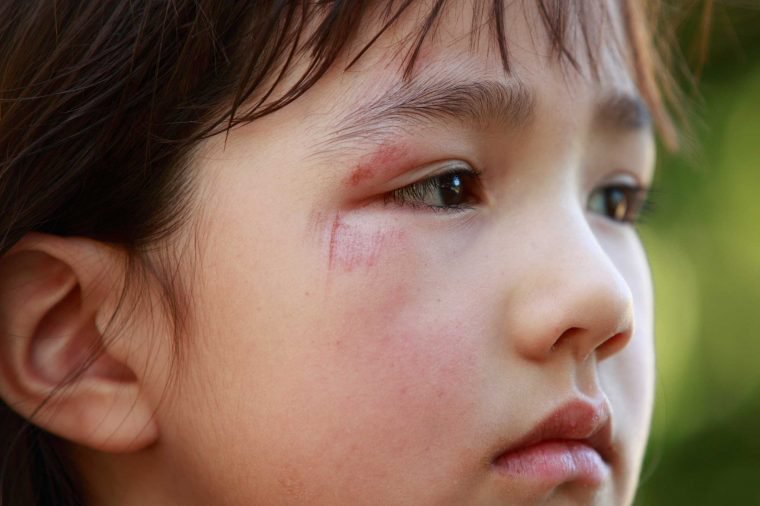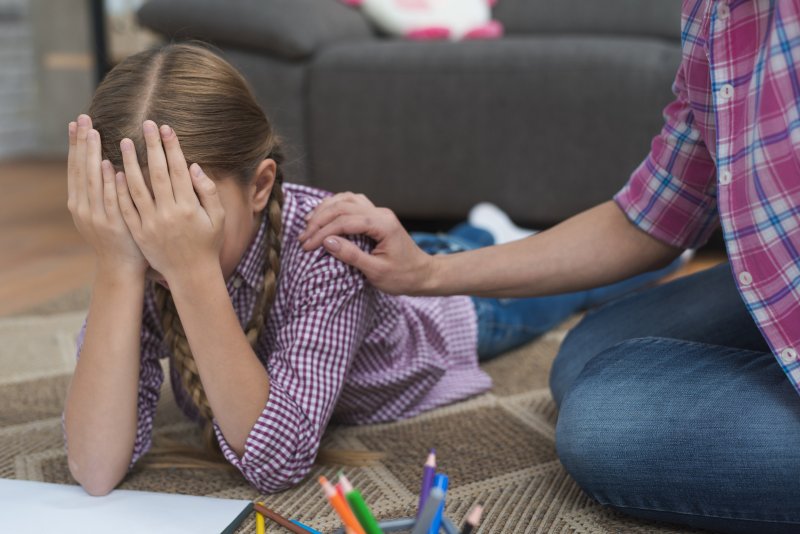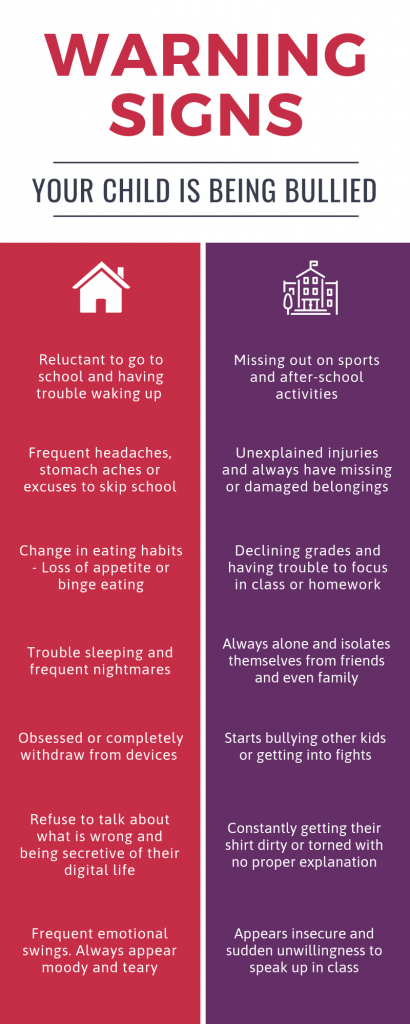School should be always exciting and fun for children, but definitely not for those who get bullied constantly. Severe, long term or frequent bullying can leave victims at greater risk for depression, anxiety and other mental-related disorder. In some rare cases, some kids have turned to suicide. Kids who become a bully’s target are more likely to be shy and timid. Those who stand out from the crowd are also a popular target, and they are usually perceived different because of their race, religion, disability, physical appearance or sexual orientation.
Bullies and mean girls have been around forever, but technology now gives them a whole new platform. Bullying can take several forms whether it is offline or online, or both:
- Physical – Beating, pushing, punching, flicking, kicking, tripping
- Verbal – Name calling, threats, teasing
- Emotional – Threats, intimidation, social exclusion
- Hazing – Unreasonable rituals or challenges, abuse, humiliation
- Sexual – Touching or saying things that is sexually inappropriate
- Cyberbullying – Online harassment, hate messages, threats, impersonation, spreading nasty comments, posting insulting or embarrassing photos and videos of others, stalking
Signs your Child might be Bullied
Being bullied as a child is not a trivial thing but we also know it is part of growing up to have painful social experiences and that learning to rebound is an important skills for kids to learn. It is truly important for parents to guide your child along the way, but then again, it is not easy to find out if your child is being bullied. With bullies threatening them, victims are often afraid and hesitant to tell anyone about it. Parents can always talk to your kids about their day with hopes that they will open up about any problem, but in cases where they are afraid, do watch out for these red flags or signs to know if your child is a victim.

Red Flag #1: Reluctance to go to School
Yes, some children do give you a hard time getting them up from bed and getting them ready for school. It is normal as we, adults also hate the idea of waking up early in the morning. However, children genuinely love going to school and being with their friends, especially after a long holiday break. If you notice that your child is constantly reluctant to go to school and making excuses to skip school, then parents should be more alert as it could be a sign of bullying. With teens, it is important for parents to check in with teachers periodically to monitor their attendance, as they are more likely to skip school altogether.
Red Flag #2: Difficulty Sleeping
“My child is always tired, even though he sleeps more than 9 hours a day. I just don’t understand why.” Let me ask you, if you are stress about a work deadline that is due tomorrow evening or if you have an important pitch to present the next day, would you be able to sleep like a log and feel fully rested the next day? This applies the same to children. If your child is anxious or scared about what might happen the next day, he or she could have trouble falling asleep or constant nightmares which results to exhaustion from a poor night’s sleep
Red Flag #3: Frequent headaches, stomach aches or faking illness
Pay attention to your child’s recurring excuses to stay home, such as headaches and stomach aches, or frequent calls from the school requesting an early pickup. Although parents may see them as fake ailments, this could signal something is wrong. Headaches and stomach aches are common physical manifestations of anxiety associated with bullying.

Red Flag #4: Change in Eating Habits
As seen in all those teenage movies, movie directors have painted the picture-perfect source of bullying – the Cafeteria. Your child may be experiencing having their lunch money stolen or their lunch trays flipped over or food thrown at them. This will then lead to a loss of appetite, refusal to even enter the cafeteria, isolating themselves from other students and ultimately a stressful lunch break. A change in eating habits or not eating at all could be a huge warning sign of bullying. Watch out for signs like weight loss, headaches, binge eating at home after school, always hungry, dizziness and other related symptoms.
Red Flag #5: Unexplained Injuries and Missing Belongings
Bumps and bruises are common injuries among grade school kids, especially if they have playground time or sports on that day. But if your child cannot explain how they got injured, or if their story doesn’t match up to the injury, this could be a signal that they are being bullied physically. Parents must also be alert if your child is regularly requesting for new stationery or books with excuses that they misplaced them.

Red Flag #6: Starts Bullying Other Children or Getting into Fights
Now, when a bully victim is constantly picked on, it is often a natural consequence that they will become a bully themselves. What’s better way to release their emotions by taking out on their siblings or weaker kids? You will notice that your child may become more aggressive, uncooperative and rebellious as well. When this happens, do not retaliate and bark at them, but instead, try to find out other signs to identify if he or she is being bullied.
Red Flag #7: Always Alone and Isolates Themselves
Bully victims often lose the few friends they have as other kids will not want to be associated with the victim and get themselves into trouble. They will eventually start isolating themselves from other children and even family, and they are always seen to be by themselves. Generally, this intrigues the bullies as they become more daring and confident to strike when the victim is alone and not surrounded by people.
Red Flag #8: Missing out on Sports and Activities
After-school activities and sports are the easiest and perfect storm for bullying. If your child who once loved a certain sports started avoiding it or they feel like they are not good enough to participate, this is one pretty clear sign that they are being bullied by other team members. Children will only lose interest in their favourite activity or sports on purpose to avoid being bullied.

Red Flag #9: Declining Grades
Every parent naturally wants our child to excel at school but grades can often be affected when a child is being bullied. Especially if your child is in fact doing great or okay academically, but their grades have been declining without any obvious reason, this is definitely a red flag. A child that is being bullied will experience high anxiety and depression, which will then interfere with their ability to focus and pay attention in class and homework
Red Flag #10: Low Self-esteem and Appears Sad
Notice if your child shows any anxiety-based or self-destructive behaviours such as tearing up while eating a meal, always moody, talking about harming themselves, and more. Even after several times trying to talk to them to share with you how they feel and yet they refused, this is definitely a red flag for bullying. In addition, when your child is constantly bullied and especially those who lack skills or assertiveness to stand up for themselves, you will notice a drop in their self-esteem, unwilling to speak their mind, and often walking with their heads down.

Red Flag #11: Obsession or Withdrawal from Devices
If your child’s bullying take place online, they will most likely be either over-attached to their devices, or completely withdraw from them. If it is the former, your child will most likely be reluctant to tell you about cyberbullying because often they feel ashamed of the social stigma or fear their devices will be taken away. Do notice your child’s behaviour and emotion while they are using the devices for more warning signs before imposing any punishment or restrictions.
Red Flag #12: Being Secretive or Protective of their Digital Life
As much as parents can monitor your children’s online activities, there is still a degree of how much you can find out. Especially when your child is already a teen, you will want to respect their privacy and let them open up to you on their own about their digital life. However, if you notice that your child suddenly became secretive or protective of their digital life, you may want to be more alert. They will surely avoid discussing about any online activities, so you need to check for warning signs such as being nervous or jumpy when getting a notification, always cringing and anxious while on their devices, tearing up often and more.

So, now that you are pretty sure that your child is being bullied, what do you do? Read our next article “What to do if my Child is Being Bullied?“ for more information and insights! Or if it’s the other way round, d0 read our articles “12 Signs your Child is a Bully” and “My Child is a Bully! What Can I do?”
Don’t forget to subscribe to us for a free e-book on Parenting in the Digital Age!









